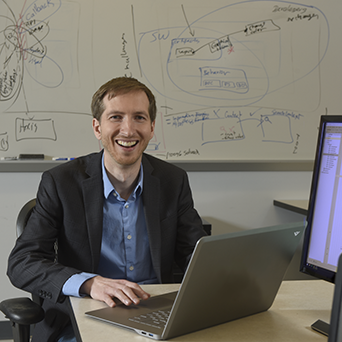“By better understanding how developers work, there are so many ways in which we can make developers more effective and our software better and less expensive.”
Thomas LaToza, assistant professor in the Department of Computer Science

Thomas LaToza, assistant professor in the Department of Computer Science, won a CAREER Award from the National Science Foundation for his research proposal on debugging software problems.
Mason Engineering researcher Thomas LaToza grew up hearing war stories from his parents, both developers, about the challenges in software engineering.
When choosing a career, he decided to research ways to make software engineers’ jobs less frustrating and time-consuming, as well as improve users’ experiences on their phones and computers.
“I wanted to do something that was interesting and had the potential of having a big impact,” says LaToza, assistant professor in the Department of Computer Science.
His work is paying off. He recently received a prestigious CAREER Award, an honor for early career researchers from the National Science Foundation (NSF), for his research proposal on debugging software problems.
He’s investigating the techniques that engineers use to resolve problems when software fails to work correctly. Tackling an issue is challenging because a developer must formulate possible reasons for the cause of the failure and test those hypotheses, he says.
“Some developers will finish the task 10 times faster than others, and industry wants to hire the people who are faster,” he says. “At the university, we want to teach students to become those 10-timers.”
The fastest developers don’t look at every line of code or everything that happens as the program executes; they focus on the pieces that matter because they’ve seen problems like this before, he says.
For the new study, LaToza and his research team will record developers—both industry engineers and Mason graduate students—working on software problems and have them sketch a view of the code they’re visualizing as they try to debug the issue.
Researchers will use their findings to create new techniques and tools to help developers record and share how they see code. These findings will help engineers work more efficiently.
The new tools will benefit users, too, because they’ll be less frustrated dealing with software that doesn’t work as it should, LaToza says. “By better understanding how developers work, there are so many ways in which we can make developers more effective and our software better and less expensive.”
This research builds on his other NSF-funded projects, in which he developed tools that helped developers create free and open-source software more quickly.
Sanjeev Setia, chair of the Department of Computer Science, says insights from both software engineering and human-computer interaction (HCI) are necessary to obtain a deeper understanding of how expert developers differ from others in their approaches for developing and debugging software.
“Thomas’ NSF CAREER Award shows that he is regarded as a leading young researcher working at the intersection of software engineering and HCI and that his proposal presents a highly innovative and credible approach to a very important research problem,” Setia says.
Mason President Ángel Cabrera notes on Twitter that this award is a “great career milestone and a sign of our impressive and growing strengths in computer science.”
